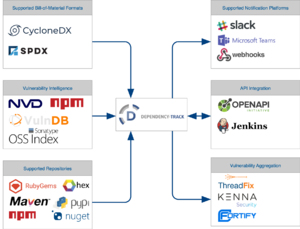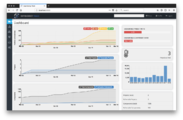This site is the archived OWASP Foundation Wiki and is no longer accepting Account Requests.
To view the new OWASP Foundation website, please visit https://owasp.org
Difference between revisions of "OWASP Dependency Track Project"
m (minor changes) |
(→Features) |
||
| (54 intermediate revisions by the same user not shown) | |||
| Line 1: | Line 1: | ||
=Main= | =Main= | ||
| − | <div style="width:100%;height:90px;border:0,margin:0;overflow: hidden;">[[File: | + | <div style="width:100%;height:90px;border:0,margin:0;overflow: hidden;">[[File: flagship_big.jpg|link=]]</div> |
{| style="padding: 0;margin:0;margin-top:10px;text-align:left;" |- | {| style="padding: 0;margin:0;margin-top:10px;text-align:left;" |- | ||
| − | | valign="top" | + | | valign="top" style="border-right: 1px dotted gray;padding-right:25px;" | |
==OWASP Dependency-Track== | ==OWASP Dependency-Track== | ||
| − | + | Dependency-Track is an intelligent Software [[Component Analysis|Supply Chain Component Analysis]] platform that allows organizations to identify and reduce risk from the use of third-party and open source components. Dependency-Track takes a unique and highly beneficial approach by leveraging the capabilities of Software Bill-of-Materials (SBOM). This approach provides capabilities that traditional Software Composition Analysis (SCA) solutions cannot achieve. | |
| − | + | Dependency-Track monitors component usage across all versions of every application in its portfolio in order to proactively identify risk across an organization. The platform has an API-first design and is ideal for use in Continuous Integration (CI) and Continuous Delivery (CD) environments. | |
| − | + | [[File:Integrations.png|frameless]] | |
| − | + | ==Features== | |
| + | * Tracks application, library, framework, operating system, and hardware components | ||
| + | * Tracks component usage across all version of every application in an organizations portfolio | ||
| + | * Identifies multiple forms of risk including | ||
| + | ** Components with known vulnerabilities | ||
| + | ** Out-of-date components | ||
| + | ** Modified components | ||
| + | ** License risk | ||
| + | ** More coming soon... | ||
| + | * Integrates with multiple sources of vulnerability intelligence including: | ||
| + | ** [https://nvd.nist.gov National Vulnerability Database] (NVD) | ||
| + | ** [https://www.npmjs.com/advisories NPM Public Advisories] | ||
| + | ** [https://ossindex.sonatype.org Sonatype OSS Index] | ||
| + | ** [https://vulndb.cyberriskanalytics.com VulnDB] from [https://www.riskbasedsecurity.com Risk Based Security] | ||
| + | ** More coming soon. | ||
| + | * Ecosystem agnostic with built-in repository support for: | ||
| + | ** Gems (Ruby) | ||
| + | ** Hex (Erlang/Elixir) | ||
| + | ** Maven (Java) | ||
| + | ** NPM (Javascript) | ||
| + | ** NuGet (.NET) | ||
| + | ** Pypi (Python) | ||
| + | ** More coming soon. | ||
| + | * Includes a comprehensive auditing workflow for triaging results | ||
| + | * Configurable notifications supporting Slack, Microsoft Teams, Webhooks, and Email | ||
| + | * Supports standardized SPDX license ID’s and tracks license use by component | ||
| + | * Supports importing [https://cyclonedx.org CycloneDX] and [https://spdx.org/ SPDX] Software Bill-of-Materials (SBOM) formats | ||
| + | * Easy to read metrics for components, projects, and portfolio | ||
| + | * Native support for Kenna Security, Fortify SSC, and ThreadFix | ||
| + | * API-first design facilitates easy integration with other systems | ||
| + | * API documentation available in OpenAPI format | ||
| + | * Supports internally managed users, Active Directory/LDAP, and API Keys | ||
| + | * Simple to install and configure. Get up and running in just a few minutes | ||
| − | == | + | ==Distributions== |
| − | Dependency-Track | + | Dependency-Track supports the following three deployment options: |
| − | |||
| − | |||
| − | + | * Executable WAR | |
| − | + | * Conventional WAR | |
| − | + | * Docker container | |
==Licensing== | ==Licensing== | ||
OWASP Dependency-Track is licensed under the [https://www.apache.org/licenses/LICENSE-2.0 Apache 2.0 license]. | OWASP Dependency-Track is licensed under the [https://www.apache.org/licenses/LICENSE-2.0 Apache 2.0 license]. | ||
| − | + | | valign="top" style="padding-left:25px;width:300px;" | | |
| − | | valign="top" | + | [[File:Dependency-Track-logo-300x100.png|250px|link=File:Dependency-Track-logo-large.png]] |
| − | [[File:Dependency-Track-logo-300x100.png|link=File:Dependency-Track-logo-large.png]] | ||
== Quick Download == | == Quick Download == | ||
| − | Dependency-Track | + | Ready-to-deploy distributions are available from the Dependency-Track website |
| − | + | * [https://dependencytrack.org/ Website] | |
| − | * [https:// | + | * [https://github.com/DependencyTrack Source Code] |
| − | * [https://github.com/ | ||
== News and Events == | == News and Events == | ||
| − | * [ | + | * [16 Dec 2019] v3.7.0 Released |
| − | * [19 | + | * [01 Oct 2019] v3.6.1 Released |
| + | * [28 Sep 2019] v3.6.0 Released | ||
| + | * [17 Jul 2019] v3.5.1 Released | ||
| + | * [07 Jun 2019] v3.5.0 Released | ||
| + | <!-- | ||
| + | * [16 Apr 2019] v3.4.1 Released | ||
| + | * [22 Dec 2018] v3.4.0 Released | ||
| + | * [13 Nov 2018] v3.3.1 Released | ||
| + | * [25 Oct 2018] v3.3.0 Released | ||
| + | * [02 Oct 2018] v3.2.2 Released | ||
| + | * [21 Sep 2018] v3.2.1 Released | ||
| + | * [06 Sep 2018] v3.2.0 Released | ||
| + | * [19 Jun 2018] v3.1.0 Released | ||
| + | * [02 May 2018] v3.0.4 Released | ||
| + | * [13 Apr 2018] v3.0.3 Released | ||
| + | * [30 Mar 2018] v3.0.2 Released | ||
| + | * [27 Mar 2018] v3.0.1 Released | ||
| + | * [26 Mar 2018] v3.0.0 Released | ||
| + | * [08 Oct 2017] v3.0 [https://groups.google.com/forum/#!topic/dependency-track/0PUJI5rNgzI Updates to community] | ||
| + | * [16 Jun 2017] [https://www.youtube.com/watch?v=88YAlzuDH04&t=50s Presentation at OWASP Summit 2017] | ||
| + | --> | ||
| − | == | + | == Community Integrations == |
| + | * [https://github.com/ozonru/dtrack-audit dtrack-audit] | ||
| + | * [https://github.com/pmckeown/dependency-track-maven-plugin Dependency-Track Maven plugin] | ||
| − | + | == Media == | |
| − | |||
| − | |||
| − | |||
| − | |||
| − | |||
| − | |||
| − | |||
| − | |||
| − | + | [https://www.youtube.com/channel/UC8xdttysl3gNAQYvk1J9Efg OWASP Dependency-Track Channel (YouTube)] | |
| − | [ | + | [https://www.appsecpodcast.org/2018/04/12/dependency-check-and-dependency-track-s03e13/ AppSec Podcast (S03E13)] |
| − | |||
| − | |||
== Documentation == | == Documentation == | ||
| − | [https:// | + | [https://docs.dependencytrack.org Dependency-Track Documentation] |
== Project Leader == | == Project Leader == | ||
| Line 74: | Line 114: | ||
==Classifications== | ==Classifications== | ||
| − | {| width=" | + | {| width="200" cellpadding="2" |
| + | |- | ||
| + | | align="center" valign="top" width="50%" | [[File:Mature_projects.png|100px|link=https://www.owasp.org/index.php/OWASP_Project_Stages#tab=Flagship_Projects|Flagship Project]] | ||
| + | | align="center" valign="middle" width="50%" | [[File:Owasp-builders-small.png|link=Builders]] [[File:Owasp-defenders-small.png|link=Defenders]] | ||
|- | |- | ||
| − | | align="center" valign="top" width=" | + | | colspan="2" align="center" valign="top" width="100%" | [[File:Project_Type_Files_TOOL.jpg|link=https://www.owasp.org/index.php/Category:OWASP_Tool]] |
| − | |||
| − | |||
|} | |} | ||
|} | |} | ||
| − | = | + | =Screenshots= |
| − | + | <gallery widths="300px"> | |
| − | : Dependency- | + | File:Dependency-Track_Screenshot-_Dashboard.png|Dashboard |
| − | + | File:Dependency-Track_Screenshot_-_Projects.png|Projects | |
| − | + | File:Dependency-Track_Screenshot_-_Vulnerable_Component.png|Vulnerable Component | |
| − | : Dependency- | + | File:Dependency-Track_Screenshot_-_Vulnerability.png|Vulnerability |
| − | |||
| − | |||
| − | : | ||
| − | |||
| − | |||
| − | : | ||
| − | |||
| − | |||
| − | |||
| − | |||
| − | |||
| − | |||
| − | |||
| − | |||
| − | |||
| − | |||
| − | |||
| − | |||
| − | |||
| − | |||
| − | |||
| − | |||
| − | |||
| − | |||
| − | |||
| − | |||
| − | |||
| − | |||
| − | |||
| − | |||
| − | |||
| − | |||
| − | |||
</gallery> | </gallery> | ||
| Line 130: | Line 138: | ||
==Dependency-Track Core Team== | ==Dependency-Track Core Team== | ||
| − | * Steve Springett | + | * [[User:Steve_Springett|Steve Springett]] |
| − | == | + | ==Sponsors== |
| − | |||
| − | + | Dependency-Track is created by a worldwide group of volunteers who have dedicated their time, talent, or provided financial support to the project. | |
| − | + | ||
| + | The project would like to acknowledge and thank the following organizations that have helped move this project forward | ||
| + | |||
| + | * [https://www.riskbasedsecurity.com/ Risk Based Security] | ||
| − | + | OWASP Dependency-Track is an open source project, created by people who believe that the knowledge of using vulnerable components should be accessible to anyone with a desire to know. By supporting this project, you'll allow the team to outsource testing, infrastructure, further research and development efforts, and engage in outreach to various communities that would benefit from this technology. | |
| − | |||
| − | |||
| − | |||
| − | |||
| − | |||
| − | |||
| − | |||
| − | |||
| − | + | {{#widget:PayPal Donation | |
| − | + | |target=_blank | |
| − | + | |budget=OWASP Dependency-Track | |
| + | }} | ||
| − | = | + | = Road Map = |
| − | + | Dependency-Track uses [https://github.com/DependencyTrack/dependency-track/milestones GitHub milestones] to track roadmaps and future releases. | |
| − | = | + | =Community= |
| − | + | Feedback from the community is always encouraged. Tell us what you like, what needs to be improved, and what features would be beneficial to your organization. | |
| − | == | + | Three ways to get involved: |
| − | + | * [https://github.com/DependencyTrack/dependency-track/issues GitHub Issues] - Collaborate on open issues | |
| − | + | * [https://gitter.im/dependency-track/Lobby?utm_source=badge&utm_medium=badge&utm_campaign=pr-badge&utm_content=badge Gitter] - Chatroom built around GitHub | |
| − | + | * [https://owasp.slack.com/messages/proj-dependency-track Slack] - The Dependency-Track Slack channel | |
| − | |||
| − | + | Pull requests are highly encouraged. No contribution is too small. Do you know how to create test cases? Help us out. Want to write (or correct) some docs? Yes please... All contributions are appreciated. | |
| − | |||
| − | |||
=Project About= | =Project About= | ||
| Line 173: | Line 173: | ||
__NOTOC__ <headertabs /> | __NOTOC__ <headertabs /> | ||
| − | [[Category:OWASP Project]] | + | [[Category:OWASP Project]] |
| + | [[Category:OWASP_Builders]] | ||
| + | [[Category:OWASP_Defenders]] | ||
| + | [[Category:OWASP Tool]] | ||
| + | [[Category:Flagship Projects]] | ||
Latest revision as of 21:27, 16 December 2019
OWASP Dependency-TrackDependency-Track is an intelligent Software Supply Chain Component Analysis platform that allows organizations to identify and reduce risk from the use of third-party and open source components. Dependency-Track takes a unique and highly beneficial approach by leveraging the capabilities of Software Bill-of-Materials (SBOM). This approach provides capabilities that traditional Software Composition Analysis (SCA) solutions cannot achieve. Dependency-Track monitors component usage across all versions of every application in its portfolio in order to proactively identify risk across an organization. The platform has an API-first design and is ideal for use in Continuous Integration (CI) and Continuous Delivery (CD) environments. Features
DistributionsDependency-Track supports the following three deployment options:
LicensingOWASP Dependency-Track is licensed under the Apache 2.0 license. |
Quick DownloadReady-to-deploy distributions are available from the Dependency-Track website News and Events
Community IntegrationsMediaOWASP Dependency-Track Channel (YouTube) DocumentationDependency-Track Documentation Project LeaderRelated ProjectsClassifications
| ||||
This project would not be possible without the existence of the OWASP_Dependency_Check project. Special thanks to Jeremy Long and the Dependency-Check core team for their hard work.
Dependency-Track Core Team
Sponsors
Dependency-Track is created by a worldwide group of volunteers who have dedicated their time, talent, or provided financial support to the project.
The project would like to acknowledge and thank the following organizations that have helped move this project forward
OWASP Dependency-Track is an open source project, created by people who believe that the knowledge of using vulnerable components should be accessible to anyone with a desire to know. By supporting this project, you'll allow the team to outsource testing, infrastructure, further research and development efforts, and engage in outreach to various communities that would benefit from this technology.
Dependency-Track uses GitHub milestones to track roadmaps and future releases.
Feedback from the community is always encouraged. Tell us what you like, what needs to be improved, and what features would be beneficial to your organization.
Three ways to get involved:
- GitHub Issues - Collaborate on open issues
- Gitter - Chatroom built around GitHub
- Slack - The Dependency-Track Slack channel
Pull requests are highly encouraged. No contribution is too small. Do you know how to create test cases? Help us out. Want to write (or correct) some docs? Yes please... All contributions are appreciated.
| PROJECT INFO What does this OWASP project offer you? |
RELEASE(S) INFO What releases are available for this project? | |||||||||||||||||||||||||||||||||||||||
|---|---|---|---|---|---|---|---|---|---|---|---|---|---|---|---|---|---|---|---|---|---|---|---|---|---|---|---|---|---|---|---|---|---|---|---|---|---|---|---|---|
|
| |||||||||||||||||||||||||||||||||||||||








